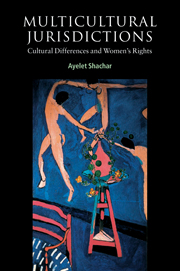Book contents
- Frontmatter
- Contents
- Preface
- 1 Introduction
- 2 The perils of multicultural accommodation
- 3 Family law and the construction of collective identity
- 4 State vs. nomos: lessons from contemporary law and normative theory
- 5 Sharing the pieces of jurisdictional authority: mapping the possibilities
- 6 Transformative accommodation: utilizing external protections to reduce internal restrictions
- 7 Conclusion
- Appendix: How transformative accommodation works in different social arenas
- References
- Index
2 - The perils of multicultural accommodation
Published online by Cambridge University Press: 22 September 2009
- Frontmatter
- Contents
- Preface
- 1 Introduction
- 2 The perils of multicultural accommodation
- 3 Family law and the construction of collective identity
- 4 State vs. nomos: lessons from contemporary law and normative theory
- 5 Sharing the pieces of jurisdictional authority: mapping the possibilities
- 6 Transformative accommodation: utilizing external protections to reduce internal restrictions
- 7 Conclusion
- Appendix: How transformative accommodation works in different social arenas
- References
- Index
Summary
In recent years debates have raged over how best to combat cultural and religious repression, about whether and how to legally accommodate difference, and about what causes ethnocultural conflict in the first place. Little attention has been paid, however, to the actual effects that multicultural policies are leaving on the lives of members of accommodated groups. Still less consideration has been given to the complex, subtle, and often injurious impact that state accommodation policies can exert on individuals within minority groups – an impact which can be so severe as to nullify some individuals' basic citizenship rights. This represents a serious omission in the multicultural debate. The present chapter aims to address this gap in the critical discussion by exposing (and elaborating) the often unrecognized costs of multicultural accommodation.
In the multicultural context, “accommodation” refers to a wide range of state measures designed to facilitate identity groups' practices and norms. For example, group members might be exempted from certain laws, or the group's leadership might be awarded some degree of autonomous jurisdiction over the group's members. Multicultural accommodation in its various legal manifestations generally aims to provide identity groups with the option to maintain their unique cultural and legal understanding of the world, or their nomos. However, multiculturalism begins to present a problem whenever state accommodation policies intended to mitigate the power differential between groups end up reinforcing power hierarchies within them.
- Type
- Chapter
- Information
- Multicultural JurisdictionsCultural Differences and Women's Rights, pp. 17 - 44Publisher: Cambridge University PressPrint publication year: 2001
- 1
- Cited by

